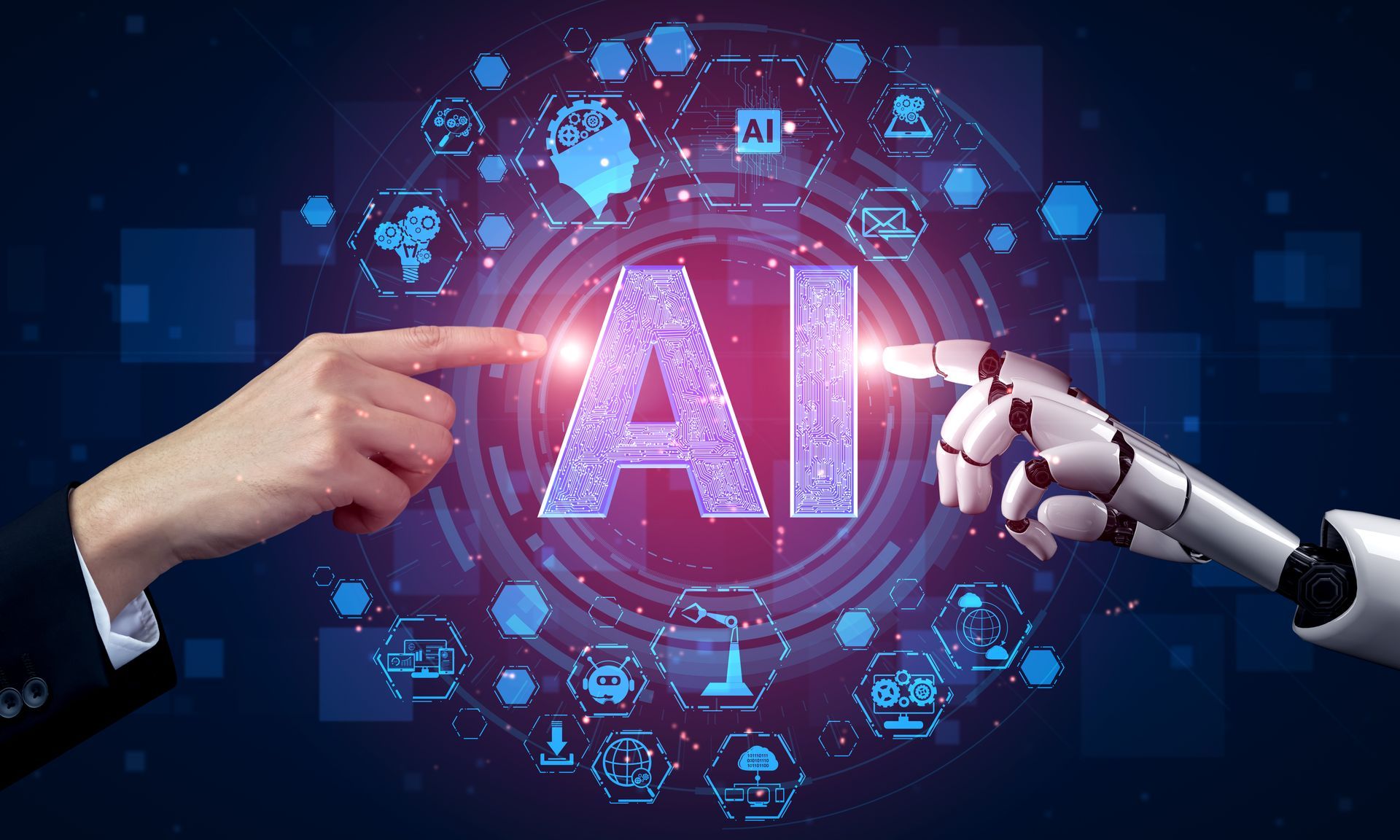Unlocking the Power of AI: A Beginner's Guide to Transforming Your Business
Unlocking the Power of A.I.: A Beginner's Guide to Transforming Your Business

Unleashing the Power of AI in Business: A Comprehensive Guide to Drive Innovation and Success
Welcome to our comprehensive guide where the dynamic world of AI converges with the realm of business. In this extensive exploration, we invite you to embark on an enlightening journey into the boundless possibilities of Artificial Intelligence (AI) and its profound impact on businesses of all sizes. As the digital landscape continues to evolve, embracing AI has become a necessity for organizations seeking to thrive in an era defined by innovation and technological advancements.
Section I: What is AI?
Before we dive into the world of AI in business, let's start by understanding what AI really is. AI, or Artificial Intelligence, refers to the development of computer systems that can perform tasks that typically require human intelligence. It's about creating machines that can think, learn, and make decisions like humans do, but with incredible speed and accuracy.
AI encompasses a wide range of technologies and techniques that enable computers to analyze vast amounts of data, recognize patterns, and make predictions or decisions based on that information. These systems can continuously learn from experience and improve their performance over time.
One of the key concepts within AI is machine learning, where algorithms are designed to automatically learn and improve from data without explicit programming. Deep learning, a subset of machine learning, involves the use of neural networks to mimic the structure and functioning of the human brain, enabling machines to process complex data and make sophisticated decisions.
From image recognition to natural language processing, AI has found applications in various domains, including healthcare, finance, marketing, logistics, and more. Its potential to automate tasks, uncover insights from data, and enhance decision-making has garnered immense attention and is transforming the way businesses operate.
Section II: Benefits of AI for Businesses
Now that we have a grasp on what AI is, let's explore the remarkable benefits it offers to businesses. AI has the potential to revolutionize the way companies operate, helping them overcome challenges, seize opportunities, and achieve unprecedented levels of success. Here are some of the key benefits of AI for businesses:
Enhanced Efficiency: AI-powered systems can automate repetitive tasks, freeing up valuable time and resources for employees to focus on more strategic and value-added activities. This increased efficiency leads to improved productivity and cost savings.
Data-Driven Decision Making: AI can analyze vast amounts of data quickly and accurately, extracting valuable insights that human analysis alone may miss. By leveraging AI algorithms, businesses can make data-driven decisions, identify trends, predict customer behavior, and optimize operations based on actionable intelligence.
Personalization and Customer Experience: AI enables businesses to deliver highly personalized experiences to their customers. By analyzing customer data and preferences, AI systems can provide tailored recommendations, personalized marketing campaigns, and responsive customer support, ultimately enhancing customer satisfaction and loyalty.
Improved Accuracy and Precision: AI algorithms can process and interpret data with incredible precision, minimizing errors and reducing the risk of human bias. This accuracy is particularly beneficial in tasks like data analysis, forecasting, fraud detection, and quality control.
Automation and Optimization: AI technologies, such as robotic process automation (RPA) and intelligent algorithms, can automate repetitive and rule-based processes, leading to increased operational efficiency, reduced costs, and faster turnaround times.
Innovation and New Business Opportunities: AI opens up new avenues for innovation and business growth. It enables businesses to develop AI-powered products and services, explore new markets, and uncover novel ways to address customer needs and preferences.
These are just a few examples of the transformative power of AI for businesses. As we delve deeper into the world of AI in business, we'll uncover more specific use cases and success stories that highlight how AI is reshaping industries across the board. So, let's move forward and discover the endless possibilities of AI for your business!
Section III: Key AI Techniques and Technologies
Now that we understand the benefits of AI for businesses, let's explore the key techniques and technologies that drive its capabilities. AI encompasses a diverse range of approaches, each with its own unique applications. Here are some of the key AI techniques and technologies:
Machine Learning: Machine learning lies at the core of AI. It involves developing algorithms that allow computers to learn from data and improve their performance over time without being explicitly programmed. Supervised learning, unsupervised learning, and reinforcement learning are common subfields within machine learning, each with its own specific use cases and methodologies.
Deep Learning: Deep learning is a subset of machine learning that focuses on the development of neural networks inspired by the structure and functioning of the human brain. These networks, composed of multiple interconnected layers of artificial neurons, enable computers to analyze complex data, recognize patterns, and make sophisticated decisions. Deep learning has proven particularly effective in tasks like image and speech recognition.
Natural Language Processing (NLP): NLP allows computers to understand, interpret, and generate human language. It involves processing and analyzing text and speech data, enabling tasks such as sentiment analysis, language translation, chatbots, and voice assistants. NLP plays a crucial role in improving customer interactions, automating support processes, and extracting insights from textual data.
Computer Vision: Computer vision focuses on enabling computers to interpret and understand visual information. By leveraging image and video processing techniques, AI systems can analyze and extract meaning from visual data. Applications of computer vision range from object detection and image classification to facial recognition and autonomous vehicles.
Robotics: Robotics combines AI with physical systems, enabling machines to interact with and manipulate the physical world. AI-powered robots can perform tasks such as assembly line operations, warehouse automation, and even complex surgeries in healthcare. Robotics holds the potential to revolutionize industries that rely on physical tasks and open doors to new possibilities in automation and precision.
These are just a few of the key AI techniques and technologies that form the foundation of AI systems. As we progress further into our exploration of AI in business, we'll delve deeper into these techniques and technologies, uncovering how they are being applied across various industries to drive innovation and transformation. So, let's continue our journey into the world of AI and its immense potential for businesses!
Section V: AI Adoption Considerations
As we delve deeper into the realm of AI in business, it's crucial to consider the factors involved in successfully adopting AI technologies. While the potential benefits of AI are immense, there are several considerations to keep in mind. Let's explore some key factors for effective AI adoption:
Strategic Alignment: Align AI initiatives with your business goals and strategies. Clearly define the problem you aim to solve or the opportunity you want to leverage with AI. By identifying specific objectives, you can focus your efforts and ensure that AI aligns with your overall business vision.
Data Availability and Quality: AI relies heavily on data. Assess the availability, quality, and relevance of your data assets. Ensure that you have sufficient data to train AI models effectively and make accurate predictions. Consider data privacy and security measures to protect sensitive information.
AI Talent and Expertise: Building an AI-enabled business requires skilled professionals who understand both AI techniques and the specific domain or industry. Evaluate your organization's AI capabilities and consider whether to hire AI experts, upskill existing employees, or collaborate with external partners who possess the necessary expertise.
Ethical and Responsible AI: Ethical considerations are paramount in AI adoption. Evaluate the potential biases, fairness, and transparency of AI systems. Ensure that ethical guidelines and legal requirements are followed to build trustworthy and responsible AI solutions.
Scalability and Integration: Consider the scalability and integration of AI solutions within your existing technology infrastructure. Evaluate the compatibility of AI systems with your current software, hardware, and data management processes. Plan for the integration and interoperability of AI systems with other business systems.
Change Management and Adoption Culture: Introducing AI into your organization requires a cultural shift. Promote a culture of learning and adaptability to embrace AI. Communicate the benefits of AI to employees, address concerns, and provide training opportunities to foster AI adoption and ensure a smooth transition.
ROI and Evaluation: Define key performance indicators (KPIs) and metrics to measure the return on investment (ROI) of your AI initiatives. Continuously evaluate the impact of AI on your business processes, customer satisfaction, revenue growth, and cost savings. Iterate and refine your AI strategies based on insights gained from evaluation.
By considering these factors and implementing a thoughtful AI adoption strategy, you can unlock the true potential of AI and drive successful outcomes for your business. As we progress further, we'll explore practical tips, best practices, and success stories to guide you on your AI journey. So, let's continue our exploration into the world of AI in business!
Section VI: Future Trends and Opportunities
As we continue our journey into the world of AI in business, it's important to look ahead and explore the future trends and opportunities that lie on the horizon. The field of AI is constantly evolving, presenting exciting possibilities for businesses. Let's delve into some of the future trends and opportunities in AI:
Explainable AI: Explainable AI aims to make AI systems more transparent and interpretable. As AI becomes more pervasive, there is a growing need to understand the reasoning behind AI decisions. Explainable AI techniques and models will play a crucial role in building trust, ensuring accountability, and addressing ethical concerns.
AI-powered Automation: Automation powered by AI is set to revolutionize industries further. As AI systems become more capable and intelligent, they can automate complex tasks and decision-making processes. This can lead to increased operational efficiency, reduced costs, and enhanced productivity across various sectors.
Augmented Analytics: Augmented analytics combines AI and analytics to empower business users with advanced insights and data-driven decision-making capabilities. AI algorithms can help automate data preparation, perform advanced analytics, and generate actionable insights, enabling business users to make faster and more accurate decisions.
AI-driven Innovation: AI is poised to become a catalyst for innovation, enabling businesses to develop new products, services, and business models. By harnessing AI technologies, organizations can unlock new possibilities, uncover hidden patterns, and make breakthrough discoveries that drive competitive advantage and differentiation.
Ethical AI and Responsible Innovation: With the increasing impact of AI on society, ethical considerations and responsible innovation will gain even more importance. Businesses will focus on developing and deploying AI solutions that are fair, transparent, and accountable, addressing issues such as bias, privacy, and the social impact of AI.
AI in Edge Computing: Edge computing, where data processing occurs closer to the source of data generation, will witness the integration of AI. AI algorithms running on edge devices will enable real-time decision-making and autonomous functionality, reducing reliance on cloud infrastructure and enhancing privacy and latency-sensitive applications.
AI-powered Personalization: Personalization will continue to be a key focus area in businesses. AI algorithms will drive highly personalized customer experiences across various touchpoints, tailoring recommendations, products, and services to individual preferences, leading to increased customer satisfaction and loyalty.
These future trends and opportunities in AI hold immense potential for businesses to stay ahead of the curve and drive innovation. By embracing these trends and proactively exploring opportunities, organizations can unlock new avenues for growth and gain a competitive edge.
As our exploration continues, we'll delve deeper into these trends, discuss real-world applications, and provide insights on how businesses can leverage them to thrive in the ever-evolving AI landscape. So, let's move forward and discover the exciting future of AI in business!
Conclusion:
As we wrap up our journey into the world of AI in business, we hope this exploration has provided you with valuable insights and sparked your curiosity about the immense potential of AI. We've discovered the foundational concepts of AI, explored its benefits for businesses, delved into key techniques and technologies, examined real-world use cases, and discussed considerations for successful AI adoption.
AI is reshaping industries, revolutionizing operations, and offering endless opportunities for businesses to thrive in a rapidly changing world. By harnessing the power of AI, businesses can enhance efficiency, make data-driven decisions, improve customer experiences, and unlock new levels of innovation and growth.
But our journey doesn't end here. The field of AI continues to evolve, presenting new challenges and opportunities. It's crucial to stay informed, keep learning, and adapt to the ever-changing landscape of AI.
We encourage you to explore further on our platform, where we delve deeper into specific AI topics, share practical tips, showcase success stories, and discuss emerging trends. Join our community of AI enthusiasts, business leaders, and professionals to stay updated and engage in meaningful discussions.
Thank you for joining us on this enlightening voyage into the world of AI in business. We look forward to continuing this exciting journey together as we navigate the future of AI-powered enterprises. Remember, the possibilities are limitless when AI and business converge. Until next time!










